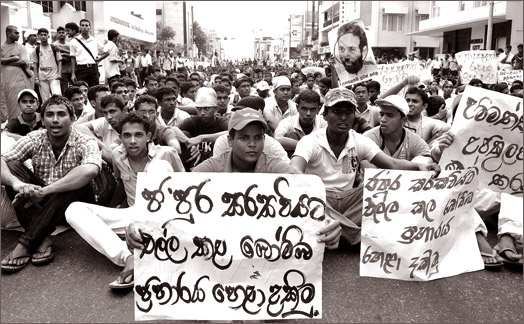Campus politics
 Campuses are seats of learning, expected to mould the character of
young educated, places where the future leaders of the country are to be
groomed. However, judging by what has been taking place in this country
for some time, it appears that the youth in the campuses of this country
tend to forget that they are only the ‘future’ leaders, if at all, and
thus in the process tend to usurp the role of leadership quite
prematurely. Campuses are seats of learning, expected to mould the character of
young educated, places where the future leaders of the country are to be
groomed. However, judging by what has been taking place in this country
for some time, it appears that the youth in the campuses of this country
tend to forget that they are only the ‘future’ leaders, if at all, and
thus in the process tend to usurp the role of leadership quite
prematurely.
Why do campus students in Sri Lanka revolt against the prevailing
leadership more as a rule than as an exception? Why do they feel that
their current leadership is always wrong and unreasonable and that only
they know what is best for them and for the country? This is a question
of national importance that deserves examining, deciphering and analysis
by the country’s best thoughts.
Student unrest
|

Jayawardhanapura students' at last week's protest. Picture by
Ranjith Asanka |
The history of university student unrest in this country dates back
to the 60s and it reached a peak in the 1970s. In 1976, a student at the
Peradeniya campus was shot dead by the police during an agitation and
the event was so politicized to be considered the precursor to the fall
of Bandaranaike government in 1977.
That time the university students just disapproved everything that
strongman of that government, Felix R Dias Bandaranaike did and he was
made to appear incorrigible, indomitable and intransigent! But today
with time there is a change of heart and there is wide acceptance of the
thankless services rendered to the nation by that upright and honest
Felix Dias Bandaranaike during those difficult times of our nation.
In the same vein it should be a matter of interest to find out where
those agitating students are today? Are those just and righteous people
among our present day politicians and bureaucrats?
This brings us to the question of who has been wrong, unreasonable
and unjust all this while; is it those in authority or is all these
‘wrongs’ some imaginary state created due to the utopian aspirations
entertained by the youth? Youth is the time of passion, for dreams, for
exuberance and the time that you feel that sky is the limit. It is also
the time that you think that you know everything about everything. Young
world is a world without barriers and limits. However, when people
advance in age they begin to realize the limits of everything. To start
with, we realize the limits of our own physical selves as we mature and
then we begin to see everything in a more realistic perspective.
University system
We did learn in our youth but it is only in maturity that we
understand the value of what we learnt. We realize how stupid we have
been in demanding a just world when nature brings everything to this
world by sheer chance. We realize that this so called generation gap is
just another name for ‘ignorance’ and ‘lack of maturity’! Thus, we see
that this unrest is more a problem of the youth than a problem of the
university system and even if these present rebelling youth are allowed
to takeover the university administration there would still be
demonstrations, protests walks and boycotting of lectures.
Now, having come to the conclusion that unrest is inherent in youth,
what course of action should the authorities take to keep this unrest at
a manageable level? How do they mange such situations in universities of
other countries? My eldest son had to join a university in the States
because he was not fortunate to get a placement in a local university.
Today he is studying for his Masters and since he had never mentioned
about an unrest in his university for the past five years I casually
posed this issue of university unrest in Sri Lanka to him. “Appachchi,
all this unrest is because these fellows in Sri Lanka do not have to
work eight hours like me and then study another eight hours. So they
have quite a lot of spare time at their disposal to indulge in
politics.” This response shook me and woke me up from my romantic dream
with regard to free education in Sri Lanka.
CWW Kannangara introduced Free Education to Sri Lanka to have a level
playing field in national education. However if Kannagara comes to know
that the system he introduced with best intentions is today being abused
to instill unrest with passionate politics he would certainly not
hesitate to prescribe a ‘period of national duty’ to every candidate who
seeks free education. After all, it is human nature to discount anything
that is offered free!
[email protected]
|



